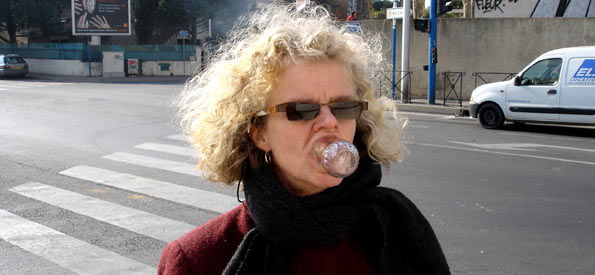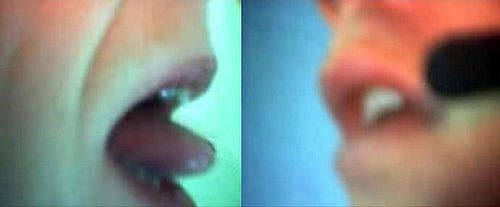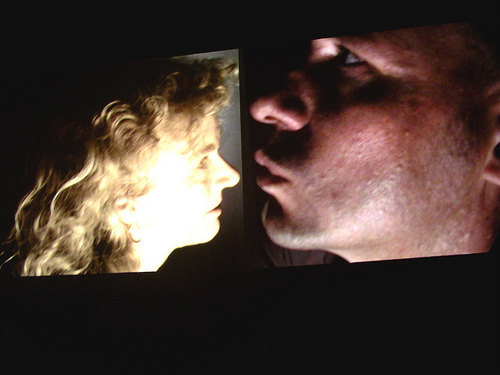“The wandering ant is the one who refuses to follow the rules of the ant colony and at the same time makes survival of the ant colony possible.” Abrahams
Annie Abrahams is a Dutch artist whose work revolves around the limits and possibilities of communication. In May 2008, Annie Abrahams was invited by InternetMonAmour to come up with a lecture/ performance presentation called “The Wandering Ant” . Abrahams would once again reflect on this metaphor in her next performance piece called “The Big Kiss” (2007) that presents the idea of how intervention by a machine results in a change in human behaviour.
Similar ideas relating to collaborating in a networked environment are also explored in her research performance piece called “Huis Clos / No Exit” that involved 5 other artists.
Yet, I personally feel The Big Kiss is notable as it strikes the very core of the idea due to its intimate subject. The presence of a physical barrier created by the screen prevents the participant from coming into direct contact with the other as usual. With only their online presence to work with, they are forced to detached themselves from their physical bodies and focus solely on the one they recognise as themselves on screen to accomplish the kiss. The strange feeling I assume from what I gather based on my own experience with the task of touching another’s finger through Adobe Connect is that there also lies an intangible barrier between our physical selves and online selves that we just can’t seem to reconcile due to the unfamiliarity of looking at ourselves online. While it is indeed the case that in this day and age, most of us have online profiles through social media networks and our phone allows us to view ourselves through a digital screen anytime we want, there is still this sense that the “me” we see online is not actually us.
As electric media proliferate, whole societies at a time become discarnate, detached from mere bodily or physical “reality” and relieved of any allegiance to or a sense of responsibility for it…The alteration of human identity by new service environments of information has left whole populations without personal or community values. – Virtual Bodies, Chapter 10, Page 214
Perhaps, like the above passage, the “me” we see on our screens is indeed free of any responsibilities relating to the physical world and is allowed to be a different person from the physical “me”,thus there lies this sense of unfamiliarity between the virtual “me” and physical “me”.
From the participants’ perspective, the kiss may feel very empty and probably awkward due to the longer time spent in trying to position their mouths and the inability to feel the partner’s physical presence. The act is no longer spontaneous, losing its intimate touch and instead becomes close to a mechanical process of finding the “right” position to place their lips. From the audience’s perspective, the kiss looks unintentionally hilarious but the placement of the screens next to each other allows us to still see some semblance of a kiss happening, thus it does not feel completely empty to us viewers.

Scene from one of my favourite films “Videodrome” (1983) directed by David Cronenberg (I thought this particular scene was pretty apt for this post)
Thus, this brings me back to the metaphor of “the wandering ant”, does a kiss that is mediated by a mechanical device enhance the experience of kissing? On the surface, it may seem like a virtual kiss makes the kiss itself redundant but taking a step back, it does make us more aware of what a kiss is all about. It makes us realise what makes a kiss a kiss is its spontaneity and intimacy rather than simply positioning the lips in the “right” position which is pretty much the same as making two robots kiss if you think about it.




You are absolutely right about the way in which the positioning departs from the normal intimacy we associate with the kiss. Annie Abrahams referred to this positioning as the dominant quality of the act of virtual kissing. I was also very interested in your response to the idea that our virtual selves are separated from our real ourselves, subjectively detached from the way we view ourselves in reality. As a result, we might not feel the need to take responsibility for our actions since they are the actions of someone else. Isn’t this true when, for example, we wear a costume and assume another identity? We feel free to act differently from our normal behavior. To be continued!